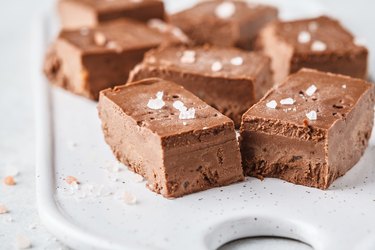
You might see the word "vegetable glycerin" a lot on labels for food, medicine and even cosmetics. Sometimes it's called "glycerol."
So, what is this product that's being used in just about everything? And is it safe? For the most part, yes — although there are a few ways glycerin may be harmful.
Video of the Day
Video of the Day
What Is Vegetable Glycerin?
Vegetable glycerin, or glycerol, is defined by the American Chemistry Council (ACC) as a widely used sugar alcohol. Glycerin in food and beverages can be used as a solvent for flavors and food colors, such as when it is used in sodas and candy.
It can also be used as a humectant, or softening agent, as it is used in cakes, candies, meats and cheeses. Additionally, glycerin in food can be used as a sweetener or preservative. It's even used in pharmaceuticals to make capsules for medicine.
The ACC explains that, cosmetically, vegetable glycerin can be found in toothpaste, hair conditioner, makeup and moisturizers. The same components that help keep food moist can also help bring moisture to the surface of the skin and keep skin smooth, and it helps protect the skin from irritants.
Glycerol's ability to protect against irritants is one of the reasons it is commonly used to make cough syrup, in which it protects the throat from irritation that might induce coughing.
Is Vegetable Glycerin Safe?
The United States Food and Drug Administration (FDA) classifies vegetable glycerin or glycerol under the category of "generally recognized as safe." However, this doesn't mean it's free from controversy. In a December 2016 study in the _Environmental Science & Technology _journal, glycerol is noted as one of the ingredients in vaping liquid.
E-cigarettes vaporize a combination of propylene glycol and glycerol, which could be dangerous for the lungs. As the Mayo Clinic points out, there is no long-term safety data showing how inhaling vegetable glycerin affects lung tissue, and short-term data shows that it can be an irritant to airways.
Although the FDA notes that glycerin in food is safe, as vegetable glycerin is turned into glucose by the body and used for energy, this does not mean it is safe in vaping.
A September 2014 study published in Cosmetic Ingredient Review looked at the safety of glycerin in cosmetics. Examining multiple studies on animal and human subjects, the review panel saw low toxicity in oral and dermal uses, and observed that for the high frequency of glycerin use, there are few instances of people reporting toxicity, irritation or sensitivity.
When it comes to inhalation, the panel considered the exposure from aerosol hairsprays, deodorants, body and hand sprays, sunscreens and so forth. After considering data from two studies, it concluded there was little risk of respiratory effects at low levels.
Even though most evidence reflects the safety of glycerol, it is still a food additive and people might have their reservations — even the Food and Drug Administration acknowledges this.
However, the administration explains that just because something has an unfamiliar name, that doesn't necessarily make it harmful. Additives can improve safety, maintain freshness, improve nutritional value and improve taste. The FDA regulates these additives, such as glycerin, to ensure they are safe for consumption.
- American Chemistry Council: “Glycerol”
- The Soap and Detergent Association: “Glycerine: An Overview”
- Mayo Clinic: “What Should You Know About E-Cigarettes?”
- Cosmetic Ingredient Review: “Safety Assessment of Glycerin as Used in Cosmetics”
- U.S. Food and Drug Administration: “Glycerin”
- U.S. Food and Drug Administration: “Overview of Food Ingredients, Additives & Colors”
- Environmental Science & Technology: "Flavoring Compounds Dominate Toxic Aldehyde Production during E-Cigarette Vaping"